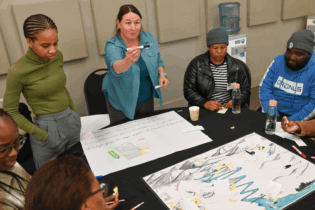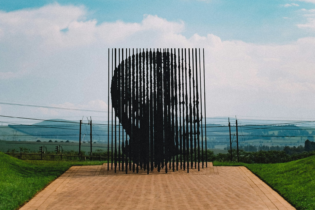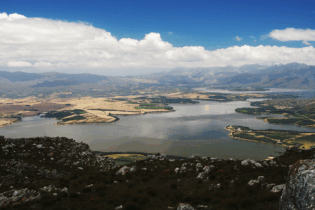South African cricketer and environmental activist, Dale Steyn (pictured), participated in an interactive discussion on his work as SAB’s Water Ambassador, at SAB’s Johannesburg office, today.
Dale was appointed as SAB Water Ambassador late 2011 and has been working with the company in spreading the message around water scarcity and protecting the resource into the future. SAB is a recognised private sector leader on water stewardship in the country with a priority focus on reducing the amount of water use to make beer for the sustainability of the business and availability of the precious water resource to all South Africans. “We are very excited that Dale Steyn is prepared to use his stature as the world’s leading fast bowler to assist in making ordinary South Africans aware of the need to save water,” Andre Fourie, SAB Head Sustainable Development.
As the SAB Water Ambassador, Dale:
“We are very excited that Dale Steyn is prepared to use his stature as the world’s leading fast bowler to assist in making ordinary South Africans aware of the need to save water,” Andre Fourie, SAB Head Sustainable Development.
As the SAB Water Ambassador, Dale: • uses his passion for the environment to promote water saving at household level
• uses his profile as top cricketer to encourage the broad public and sports enthusiasts to take water stewardship more seriously
• inspires other sport stars to take on the cause of water responsibility
• encourages SAB staff, customers and consumers to minimise water use and re-use water where possible
• reminds political leaders of the importance of minimising waste of water at municipal level and investing the required infrastructure to ensure clean water into the future. “This is a very exciting opportunity to work with SAB and their sustainable development division. There is so much for me to learn on this topic but I believe that I will be learning from the best. They are very experienced in this field and am looking forward to our future together,” says Steyn SAB has a clear action plan on water stewardship which includes reducing the amount of water to make beer, engaging farmers in the supply chain to sue less water when growing hobs and barley used to brew beer, and helping communities with access to clean water. SAB has undertaken a detailed water footprint of its operations and is acutely aware of water risks facing the company and the country over the next few decades.
The company works with local municipalities to address access to clean water at a local level. In addition, SAB has formed partnership and works with the WWF and GIZ (the German technical agency) to understand and manage the implications of drought in the George area for the hops industry.
Dale Steyn’s top 10 water saving tips:1. Report leaking pipes or taps at work or in the street- and follow up until it is fixed. This is probably the biggest contribution we can make. Even walking down the Sandton streets it is amazing how often water just stream down the road for days!
2. Fix dripping taps at your own home!
3. Shower rather than bath- and don’t fill the bath to the rim every time you bath
4. Close the tap every time you shave or brush teeth
5. Insert a bottle of water in the cistern of the toilet- this way you save a litre of water every time you flush the loo!
6. Plug the sink in the kitchen when just washing hands or rinsing vegetables
7. Use a bowl to catch the water in basin if you are just waiting for the water to get warm – and use this to drink or water on the plants
8. Fully load your washing machine or dish washer before you wash, or make sure you choose the correct cycle for smaller loads
9. Use a bucket of water to wash your car rather than keep the hose pipe running
10. Regularly check your water meter and municipal bill- this will help you pick up leaks and save you costs
Background
There are significant regional variations in water scarcity within South Africa. It is estimated that by 2025, some parts of the country will face major challenges, whereas others will have plentiful supplies of water. This issue is exacerbated by increasing competition for water resources from both agricultural and industrial users. SAB’s water footprint and water stewardship
The net water footprint for SAB Ltd and its value chain is 511,100 million liters. The most significant part of this relates to water used to cultivate crops, which accounts for over 95% of the total footprint. The next most significant element relates to water used for brewing and soft drink production, accounting for the remaining 5%. SAB currently uses just under 4 litres of water to brew a litre of beer- which is in line with international good practice. So how can a company respond to these challenges and water risks in the South African environment? SAB has developed a water game plan that is based on four pillars. Firstly, to brew more beer by using less water. A few years ago the company used 5 litres of water to brew 1 litre of beer, which is not far off the current world average. With major investment in new technology and processes, the current status is just less than 4 litres of water/litre of beer, and there is a firm commitment to get this ratio down to 3.5 by 2015. Secondly, to demonstrate water stewardship in the supply chain. Being one of the first brewing companies in the world to undertake a detailed water footprint, the company realised that more than 90% of water needed to make a litre of beer is used in our agricultural supply chain. Some of the farmers who supply SAB with barley and hops are already demonstrating serious commitment to reducing the water used to grow these key ingredients of good quality beer. Others are just starting on this journey. SAB recently brought together key stakeholders in the George area which is both under water pressure and the only part of the country where hops is grown commercially. Working with the local authority and stakeholders such as CSIR and WWF, a water-risk assessment was undertaken. This pointed to the implications arising from likely future scenarios in the local hydrology and economy and the impact of global climate change. SAB is currently working with stakeholders to evaluate options for response e.g. clearing and rehabilitation of invasive alien plants which will release water into watershed and create local jobs. Finally, to ensure good water governance. Internally, this means to make sure water is on the agenda of the relevant SAB committees when the company takes decisions regarding future investments or facilities. Externally, SAB has come to realise the importance of the Water Futures Partnership with WWF and GIZ to ensure the company keeps a holistic perspective and looks beyond its own immediate short term water interests.






